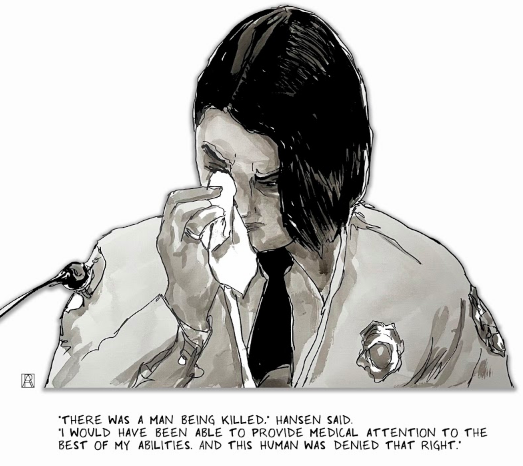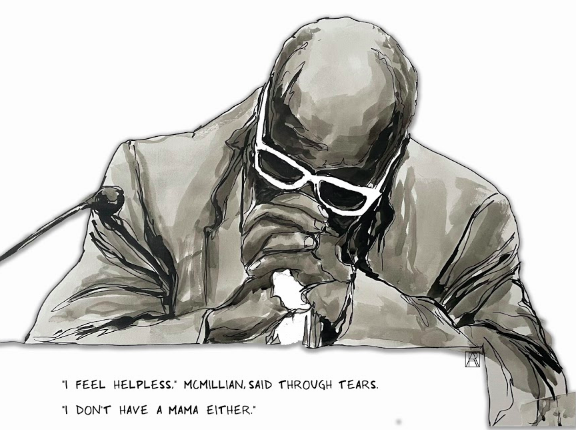Written by Anonymous
While scrolling on social media, I came across political artist and activist Alex Rudin, who has created images that illustrate the turmoil surrounding the witness at the scene of the murder of George Floyd. Not only did she accurately depict the emotions of the witnesses, but her powerful images reminded me that this wasn’t the first time that something like this has happened. This trial makes me feel like our country is on trial.
I had mentioned the trial to my significant other, who is a white male, and who I was afraid would not understand. How could he, I thought to my self. He didn’t grow up in a town where the people were predominantly Black or Brown. He didn’t have to feel afraid or uncomfortable that the clerk at the store watched him if he put his hands in his pockets or scared of getting stopped by a police officer. I quickly had to stop my self from these thoughts. I knew in my heart that what I was feeling was resentment and maybe even pent up trauma. I felt grief for George’s family, I felt sadness for my brothers and sisters of color for the years of abuse, oppression and injustice, and I wanted to understand this feeling, because something in my heart told me that the witnesses of the murder of George Floyd might have felt this way too.
I spoke to Dr. Randall Bell, a world-renowned expert of trauma who said, “Trauma has a way of showing up when we least expect it, and society sends many signals telling us that it’s admirable to put on a brave face and soldier on. But our grief is normal — even healthy.”

“The hallmark error is to continually dodge the pain. There is a time and place for avoidance. However, to heal and grow, we cannot doge the pain forever …,” he writes in his new book, Post-Traumatic Thriving: The Art, Science, & Stories of Resilience. “Suffering is our opportunity to stare our moral compass in the eye and deal with the problem in a dignified way.”
“Is it important to note that by college age, 66 to 85 percent of all people have been impacted by trauma, and for those who have trouble processing difficult circumstances, the results can be devasting — even leading to crime, addiction, anger or anxiety,” said Dr. Randall Bell.
As I started to navigate my trauma, I began to heal through online communities and admired those bold enough to speak out against injustice.
“Our world is in desperate need of growth, and it starts with people simply promising to do better. A promise to do better for themselves, for those around them, and for those who will follow. It is critical to understand that the roots of culture stem from artistic movement. If creators dedicate themselves to exposing the truth we can incite a social revolution. It has happened time and time again, and today, we are ripe for change.” said Ms. Rudin.

If you are interested in helping to make a change, please support these local and national organization:
Communities United Against Police Brutality
For more on Dr. Bells book, please visit: www.posttraumativthriving.com
For more on Alex Rudin please visit: www.alexrudin.com.
Follow her on Instagram: @_alexrudin
You must be logged in to post a comment.